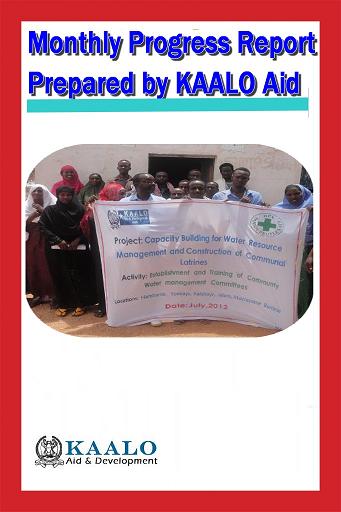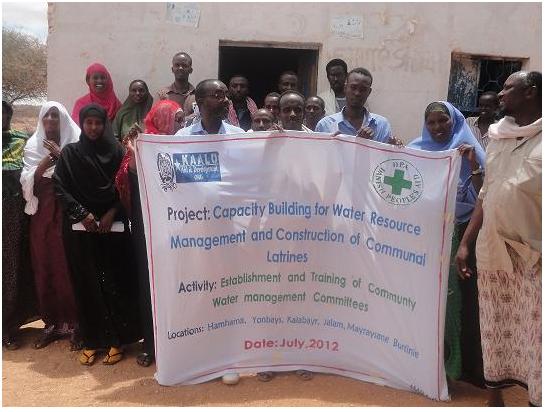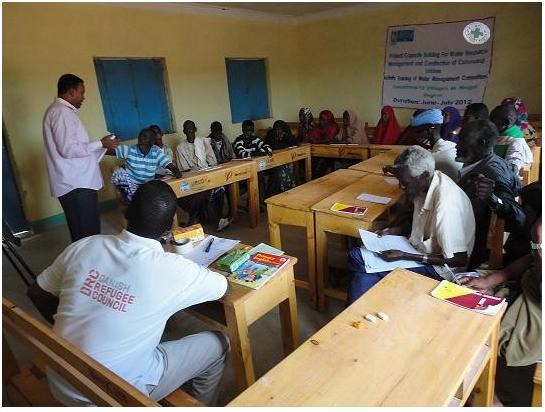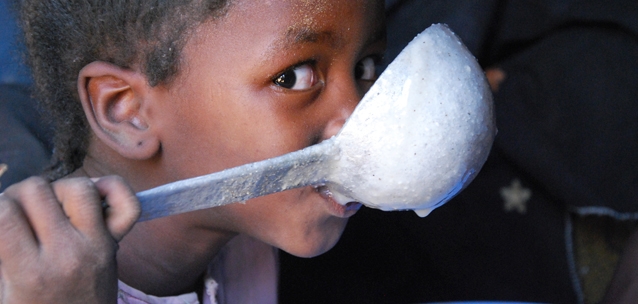Monthly Progress Report
Prepared by KAALO Aid
| Project title: |
Capacity Building for water resource Management and Construction of Communal Latrines in Nugaal Region, PuntlandCountry:
Puntland, SomaliaReport period:
1st April 2012 – 31st march 2013Status for performance for expected objectives up to the end of this report period (please tick off)
Delayed:
Partially delayed:
ü As expected:
Partially ahead:
Ahead:
Does the progress report contain which requires a rapid response from DPA?
Yes:
ü No:
See section:
1. Developments in the country of relevance to the implementation of the project
Executive Summary
The project of capacity building for water resource management and construction of communal latrines is being implemented by KAALO Aid and Development in partnership with Danish Peoples’ Aid. The aim of the project is to boost the capacity of the water management committees on many areas through broad based capacity building trainings on organizational management, conflict resolution skills, health, hygiene and sanitation. Alongside with this capacity building, the project will also construct 10 communal latrines in Garowe , Burtinle IDPs and Godobjiran village
KAALO is a local non-governmental organization always committed to partner with development and Humanitarian agencies both UN and International organization. It has also a long term experience in successfully implementing community development and WASH related projects.
This report covers a period of one month (june), in this period the project executed activities ranging from establsishment of Community water management committees in six villages of Nugaal region an training of six community water management commitees.
The objective of the project is to raise the capacity and awareness of the water manamegent commitees in 12 villages of Nugaal region, puntland and construct communal latrines in two IDP camps and one village of Godobjiran whcih will in turn promote sustainability and onwership of water resource and contribute to the promotion of better health, hygiene and sanitation practice.
The facilitator explaining something to the trainees during one of their training sessions in Dhaganle village of Nugaal region.
Background
Somalia has experienced a prolonged drought which has turned to famine in the year 2011. In Puntland the famine claimed the only source of living of the people which is livestock and dried up almost all the communal water points. Rural dwellers and IDPs were the ones that mostly felt the disaster because of their vulnerability to any calamities.
Clashes between communities over water use and migration from rural areas to urban areas were the consequences of the droughts. Conflict over water use often happens due to poor management of the water sources and lack of the communities understanding on ownership. In rainy seasons, people are freed from shortage of water and they usually store the rain water in berkads and tanks. Rainy seasons come with waterborne diseases as a result of flooding and communities are attacked by different waterborne related diseases.
The target location of the project which is 12 villages in Nugaal region is faced with problem of water management and diseases related to waterborne. In the past years some initiative related to rehabilitation and construction of water points were undertaken in these areas. In order to contribute to the sustainability of these water sources KAALO found it necessary to empower the local communities by establishing water management committees and afterwards conduct capacity building training and awareness raising workshops for the committees. In a bid to promote better hygiene and sanitation practice, in the course of the implementation period the project also aims to construct 10 latrines in two densely populated IDPs of Garowe and Burtinle and one village of Godobjiran.
2. Project Activities
Establishment of community Water Management Committees
Prior to the training of the water management committees, KAALO through the project Manager, Officer and the Community mobilizer organized a meeting with all the stakeholders of WASH, that is the local Administration, local leaders, youth and the Ministry of health and set a criteria for establishing the water management committees in the 12 villages of Nugaal region.
The exercise was first started from Garowe and it has been successfully done and twenty members were selected to be part of the water management committees and out of the 20 members a two officials (chairman and vice chairman) were elected by the 20 members with the help of the project facilitator and project officer to lead the members. The two officials will appoint a secretary general, publicity and treasurer from the members. In the course of community water management establishment, KAALO followed Gender mainstreaming guideline highlighted in the project proposal. 8 out of the 20 members were women representing 40% of the total number while the remaining 12 persons were men representing 60%. This has been the case in all the six villages so far WMC established.
Training of established community water management committees
The training of the Community water management committees started early June and was facilitated by a qualified facilitator hired by KAALO. The facilitator prepared a training module and a training schedule submitted to DPA a month ago. The module submitted to DPA was written in English but a translated module in Somali version was prepared by the facilitator for easy understanding of the content by the trainees.
The module contained among other aspect, Organizational management, leadership, water supply system, public health, water borne diseases, hygiene etc. The facilitator organized training into phases and in the first phase (June); committees were trained on organizational and managerial aspect inclusive of conflict resolution relating to water use. Areas where the training was conducted in the month of June include: Garowe, Gubato, Dhiganle, Dilinmahato, Godobjiran and Hasabahale of Nugaal region.
So far, six water management committees were established and trained on different topics relating to managerial and organizational aspect and they include: the importance and function of water management committee, Rules and regulations governing water management committees and conflict management relating to water use as part of the first phase training, and the remaining six villages/communities are expected to be trained in July, thus concluding the training of the 12 villages/communities in June and July.
One of the training participants in one of the training sessions answering question asked by the trainer
3. Status for objectives and indicators
Comparison of planned and actual accomplishment
| Activities Planned for this Month | Timeline | Status |
| Establish Community water management committees | June | Complete |
| Conduct training for 6 villages in Nugaal region | June | Complete |
| Submit monthly Progress Report | June | Complete |
Participants undertaking group discussion as the training goes on in one of the villages among the six villages
4. Problems and/or new possibilities
No problems were encountered in the preparation stage of the project
Looking ahead: Activities planned for Next month
| Activities Planned for next month | Timeline |
| Continue establishing Community water management commitees for the remaining six villages | July |
| Continue training for the remaining six community water management committees in Nugal region | July |
5. Changes and adjustments
No changes and adjustment of whatsoever was made.
Water management committee members voting for both the chairperson and the deputy chairperson in Garowe district of Nugaal region
6. Status for expenditure
| Total budget in (use project currency): |
DKK 939,375.00
Budgeted expenditure at the end of this report period:
DKK 261,404.00
Actual expenditure at the end of this report period:
DKK 145,974.40.00
Achievements
- Community water management committees successfully established in six villages of Nugaal region
- Community water management committees in six villages trained on various topics relating to organizational management and conflict resolution relating to water use
- The establishment and training of water management committees has contributed to the effective coordination and collaboration between the villagers of the targeted areas.
7. Future budget adjustments
No need for additional budget adjustments
8. Coordination with others (attach records in Appendix)
9. External relations
10. Security update
The security situation of the project target location is conducive and there are no foreseen threats in the project implementation process.
11. Staffing requirements (attach actual list of staff with positions and local ID and contact numbers in Appendix)
Read More PDF Monthly progress Report-June _1_






